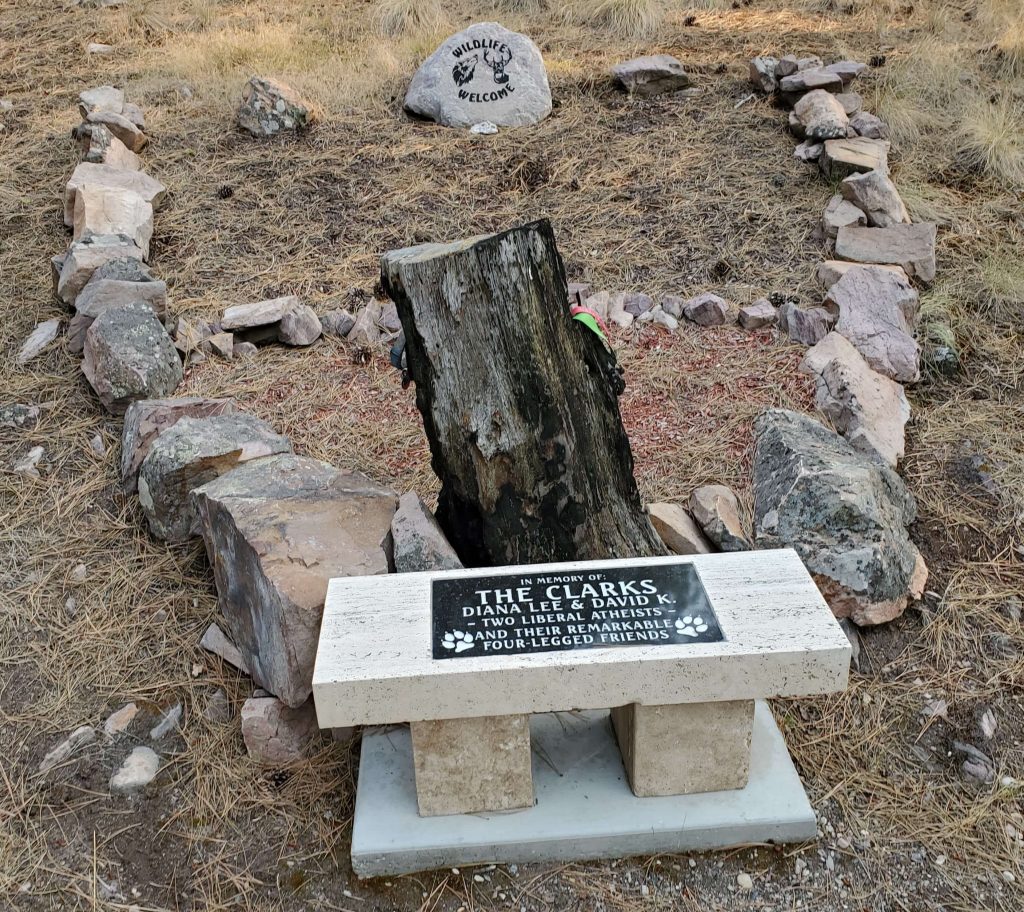Biography
Biographical Comments
Atheist; Atheism. Are these the right words—those which bespeak my deepest commitments? My latest book title—Atheism, Morality, and the Kingdom of God—might very well suggest this. Yet the inference would be a mistake.

I am an atheist; but I have not argued that atheism is true. I have argued for something vastly more significant. First, God (and hence theism generally) is irrelevant to morality. Second . . . the life of faith [not: a mere belief in God]—i.e., the life defined as the absolute dedication to a deity—is clearly conceptually incompatible with the life of virtue. (AMK— See Writings Menu).
The above quote embodies two key riddles. I will address the first shortly (morality vs God). For now we’ll consider the second. Work with it as you may.
Virtue and faith are incompatible. Why? Absolute dedication to a deity entails that you will commit the worst, most heinous acts if your deity so commands. That is precisely because this allegiance to a Deity is your defining commitment. As such, it cannot be overridden. Therefore, since a person of faith is committed to doing wrong whenever directed, the person of faith cannot be a virtuous person. Take your time with this. There is no way out. (See AMK, Chp. 1, under Writings)
The virtuous life, by contrast, entails that one has acquired knowledge (not mere opinion) of the morally right, has the courage to act accordingly, is motivated to do so because it is right (not for selfish reasons), and is dedicated to cultivating the requisite knowledge and character to achieve these ends. (See AMK, Chp. 1, under Writings)
Time for the theorem. If we assume that the morally good life (virtue) is essential to the overall good life for humans (let us say, human flourishing), then it is clear that human flourishing leaves no room at the inn for the life of faith. Because flourishing requires virtue, and faith is incompatible with virtue, faith is also incompatible with the good life for humans.

As you can see then, atheism is not a premise. Nor is it a mere opinion. It is a conclusion wrought within a much greater comprehensive scheme of inquiry. Such results do not emerge without cost. It is work, and it is a passion. Among other matters it requires the examination of those cherished, yet unexamined beliefs and practices which otherwise command our daily allegiances. This does not come to fruition through either the dilatant or the numbed mind. It is an existential challenge. Can we handle the truth? To do less, as Aristotle once put it “. . . is to live the life of a plant.”
The alternative then is, in a word, the philosophical life. Such a life is defined by the unwavering commitment to truth—especially about such fundamental matters as morality, virtue, and human flourishing. It is here that humans have a chance to be all they can be. There is no alternative.
+++
Caution is required here. Some will be tempted to turn to science for guidance. Why not? Science affords virus protections even while probing the depths of the universe itself. But notice! On basic philosophical questions, the sciences are silent. Philosophical questions are clearly not scientific in nature. How could science possibly inform us about morality or the good life? Think! Which science is the science of justice?! And exactly what is justice, and how can we know?! Or, within a mechanistic universe, how can the very ideas of human freedom and responsibility even make sense? Fundamental questions such as these are central to the task of philosophy. We ignore them at our peril.
For example, amidst today’s civil unrest in America, many yet insist that the Civil War itself was never about slavery; it was about state’s rights. Rights! Is this claim true? The answer to this question requires not history, but a philosophical examination of justice.
For isn’t the real question here whether the institution of American slavery was itself just? And the answer to this is obvious. So let us ask whether any state has the right to treat its citizens or inhabitants unjustly? By now the question has become purely rhetorical. No, the War was never about state’s rights, it was always about the claim to just (fair and equal) individual treatment.

This realization has far reaching implications. Suppose we now ask whether any State (e.g. Israel) has the “right to exist” if it systematically fails to deliver justice to those under its control. With God now out of the picture, the answer is again obvious. Genuine leadership—statesmanship—requires knowledge about the very nature of justice, something scientific inquiry cannot penetrate.
Without the crisp and enlightening answers necessary for leadership, there is no chance that we will advance our knowledge of how to best resolve today’s most pressing and haunting challenges. E.g., immigration, jobs, guns, taxation, climate control, and myriad others. Again, science cannot bring closure to such questions. Statesmanship, leadership, is best informed when it is spearheaded by philosophy.
Absent such guidance, past wisdom available through the arts will elude us. We’ll uncomprehendingly stumble about within our favorite mantras while our ability to defend them is reduced to marching, raising our voices, and even brandishing firearms. Unlike Sunday School, genuine education does not indoctrinate us. It liberates us.
+++
The ancients knew well that the philosophical life cannot come to fruition within the “ivory tower.” It is rather a means of dwelling which is profoundly embedded in the ways of the world. It must be lived (we must learn to provide), endured, and celebrated. Even if dedicated to virtue, we will likely encounter suffering and frustration.
But flourishing also urges us to discover and develop our talents wherever they may lie. The pleasures are immeasurable. A healthy body is fit to appreciate the beauty, value, and complexity of a challenging and often perilous world. We are invited to develop our aptitudes and cultivate others. We are privileged to bathe in the joys of music and the natural world while inviting others to do the same. The charge then of the philosophical life is to discover, probe, and master how best to respect and honor the greatness of reality. We can hone our abilities and never stop learning.
+++
So now it is time to comment on riddle #1. How can there be morality without God? Why aren’t we left with nihilism, where the significance of human existence is reduced to embracing its struggle? These are wonderfully philosophical questions which deserve our most careful attention. Thus the reader is again invited to consult the Writings Menu.

I fear there are no shortcuts along this journey; but I cannot resist a comment. Nihilism is simply false, and there is certainly morality without God. The argument consists in showing that the world is a plenum of greatness—of things that deserve honor and respect in their own right. This desert carries the mandate that such intrinsically valuable “things” be treated with the respect appropriately due them. Indeed, this is the root of moral obligation. So the universe is always already “morally charged,” independently of its origins—e.g., God, nature.
+++
I don’t mind offering a sketch of my personal journey through the philosophical life. This is best traced in my memoir Mile High Redemption (see Writings). Although privileged to live and work in several states, I was mostly raised in a Western Montana mining town—a distinctive feature of which was its evangelical underpinning. I didn’t realize it immediately of course, but my philosophical journey began there. My father worked in the concrete construction industry. Subject to this opportunity and influence, I soon became a journeyman and subsequently the business owner. The PhD was acquired at the University of Purdue. I then served ten years as a Justice of the Peace in Missoula Mt, and thereafter taught Philosophy and Liberal Studies at the University of Montana. Although recently retired, philosophical engagement remains. It is my life.
So I have continued writing and sharing stimulating conversation with friends. And as an amateur musician, opportunities to play and sing with family and friends are not to be missed. A single day without music is to diminish it. Although I have never lived in the wilderness, I confess an attraction to “the call of the wild.” Nestled in the Bitterroot Mountains, the opportunities for physical engagement seem endless—biking, running, hiking, skiing, exploring. Moreover, landscaping and working our ten acres of forested land (mostly with an axe) is not only thrilling and deeply satisfying, it affords a bit of a window to our ancestors. And having relished the skill set of concrete work, I still imbibe upon occasion. I do not have a cell phone.

And then there are the dogs. Partial to Siberian Huskies and German Shepherds, words cannot begin to express (although I try—Writings) the joyful times we have shared and how much I have learned from them. I pay tribute to the catchphrase: “To err is human; to forgive is canine.” My dogs put me to shame.
And with my still beautiful wife, Diana, I have shared fifty-five years of love and marriage. We have two exceptional children who love us, and have afforded us the privilege of watching their families grow, struggle and prosper.
+++
There is truth however to the Aristotelian notion that human flourishing requires “luck.” While the directives of justice leave us tasked with the endeavor to transform and improve our lives, the universe itself is not just. Moral mandates apply to moral agents; but the universe is not itself a moral agent. And some of us are not “lucky” at all. Yet most of us do not carry the burdens of the severely disabled—although aging moves us all progressively closer to something like these. Should life become endlessly tragic and unbearable, against this malaise we may well be faced with only one relevant question. Are we obligated to live and suffer out of respect for those who care for us? If not, we may decide to opt out.

Personally, I have been lucky. Despite some misfortunes (four back surgeries, multiple broken ribs, broken tibia, crushed calcaneus, bouts with kidney stones etc.), I know that I am among the fortunate. Thus far, each injury affords an opportunity to forge through a new challenge. But doing so is accompanied with a keen awareness of increased vulnerability.
So, while atheism does not define me, religion is a false God which, among other fairy-tales, have no place in my life. “No atheists in foxholes?” I have twice faced down death without a whisper of foreboding concerning my “soul.” Overall, my life has been rich and I’ll take that for as long as it lasts.
As for dying, I truly have no plans to do so at all. But if I am perchance to die, I’m quite sure I’ll never know it.
David K. Clark
July, 2020

